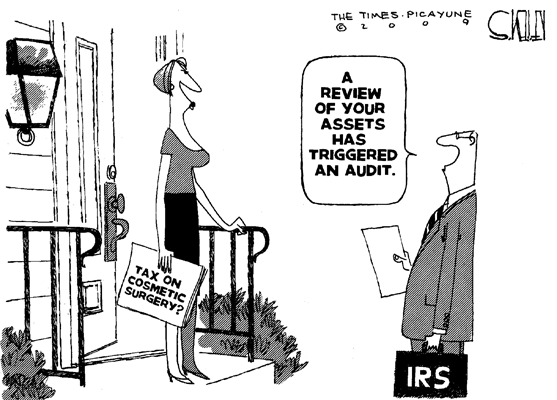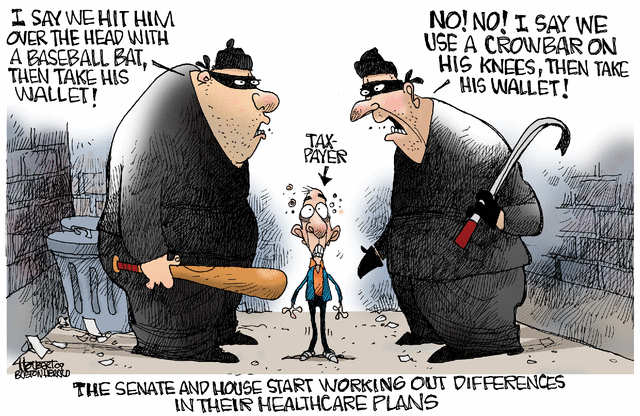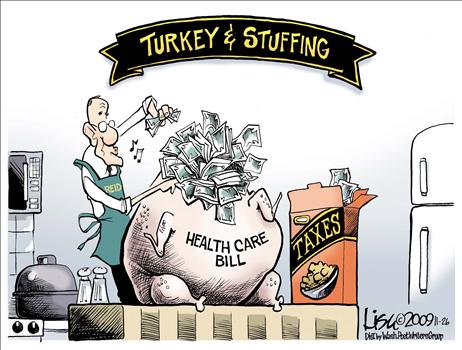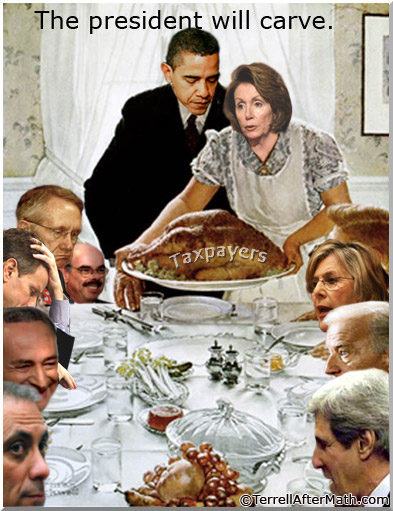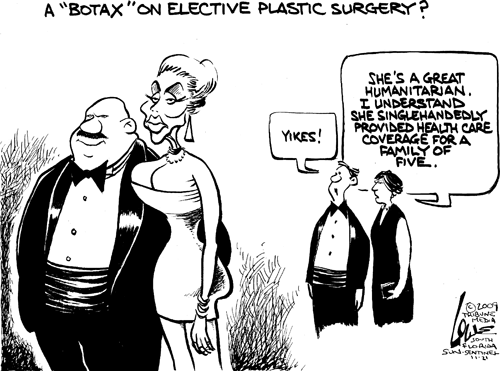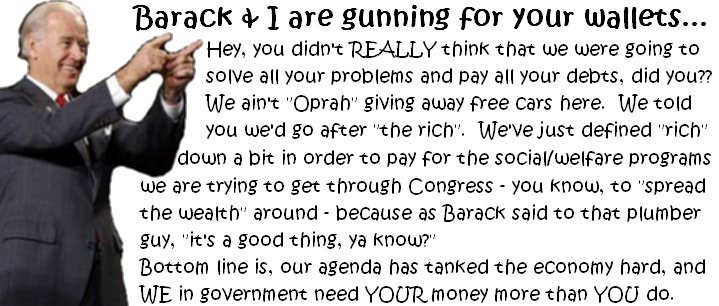Taxes Paid In vs. Taxes Owed
Tax planning and ensuring that you have enough paid in to avoid penalties has never been crazier. The Feds have reduced withholdings and given rebates to encourage spending in the economy; while the geniuses in Sacramento are trying to force California taxpayers to intentionally overpay their withholdings as an interest free loan to Governor Arnold and his fellow idiots in control of that sinking state.
That’s the subject of this vidcast.
Labels: video
War Is the Health of the Taxman. Democrats want a temporary war tax on the rich, like the one from 1898. – Kevin Williamson gives an excellent recap of the “temporary” taxes that were supposed to be only for the evil rich over the past 150 years in this country. As should surprise nobody, temporary taxes live on forever and slowly grow to apply to just about everybody. No sane person should expect any different result from the new proposed tax by the DemonRats.
Investing retirement funds into C corp
Q:
Tax Guru
In 2005 you recommended the use of the BeneTrends rainmaker plan for using your 401k funds to finance a company. Have you had anymore experience with them in the last four years? I am thinking of using them, but am worried that there may be some problems with the IRS.
Any help you might give would be appreciated.
Best Regards,
A:
I haven't heard of any problems with the BeneTrends program, and in act I am still recommending it, as in this recent vidcast.
Good luck.
Kerry Kerstetter
Using Multiple Entities - Vidcast
Using multiple entities for tax, liability, and other business reasons has been a very common and useful strategy for longer than I’ve been in this business. Why many tax pros are unaware or unwilling to recommend them is still surprising to me.

Exclusion from Gift & Estate Taxes
Q:
Subject: Estate Tax Exclusion
Mr. Kerstetter,
I found your writeup on estate and gift taxes via google search, and then I read your blog with great interest.
Thank you for publlishing it.
You have this text on your page:
If you do give any one person more than the $13,000 during a single calendar year, you must file a 709 and either pay gift tax or use part of your lifetime exclusion. When you pass away, the amount of exclusion that will be available on your estate tax return (706) will be whatever the exclusion is at that time reduced by the gifts you reported on 709s during your lifetime, where you opted to offset them with part of your lifetime exclusion. If you never used any of the credit by keeping your gifts below the annual limits, the full amount of the credit will be available to your estateMy wife and I have six children, so we're trying to get some intelligent estate planning done. The lifetime exclusion I understand is now $3.5M. Is this $3.5M total for the estate, or $3.5M for each heir?
Thanks for your help.
A:
I have a chart of the annual estate tax exclusions on my website.
For people passing away in 2009, there is an exclusion of $3.5 million of net estate value per decedent.
The lifetime exclusion on gifts is set at one million dollars.
You should be working with an estate planning professional because there are a lot of changes on the horizon; so you want to make sure any plan you set up is flexible enough to be able to handle the changes.
Good luck.
Kerry Kerstetter
Snipes Appeals Overly Taxing Prison Sentence – The Hollywood lunkhead’s tax planning strategy is still on course for him to stay at Club Fed for at least a few years.
2010 Vehicle Depreciation Limits
CCH has calculated the inflation adjustments for the depreciation limits on business vehicles first placed into service in 2010. Based on past experience, they expect IRS to release their official version of the calculation in April 2010.
Ever since the ridiculously low luxury car limits on depreciation were initiated in 1984, we have had to break the news to clients that they were driving luxury cars in the eyes of the IRS, even though that wasn’t reflected in reality.
The new limits per CCH:
Passenger Vehicles:
Year 1 $3,060
Year 2 4,900
Year 3 2,950
Year 4 1,775
Year 5 1,775
Five Year Total $14,460
Trucks & Vans:
Year 1 $3,160
Year 2 5,100
Year 3 3,050
Year 4 1,875
Year 5 1,875
Five Year Total $15,060
From the latest issue of Intuit’s ProConnection Newsletter:
What's New on the 2009 Form 1040
If you haven’t seen the 2009 1040, here’s the most recent version from the 2009 Lacerte program.
Labels: TaxForms
CPA Blogging
I’ve lost track of the number of CPAs and tax professionals who have asked me for advice on building up a clientele. I always advise against paying those “marketing” firms that promise to attract new accounting and tax clients via their deceptive advertising. Those are scams.
I have been telling several people that doing a blog and showcasing what you know and how you feel about tax and business issues is the best way to attract new clients. In spite of the fact that I have made it known for the past few years that I am not accepting any new clients, I continue to receive requests from people to take them on as clients on practically a daily basis.
In fact, if blogs had been around in the early 1990s, I could have saved a lot of time driving around Arkansas, Missouri and Oklahoma presenting my Realtor seminars and built up my practice via the internet. That’s how I would do it if I were starting out in a new market today.
I mention these obvious points in conjunction with this article on CPA blogging from AccountantsWorld that Ohio CPA Dana Stahl forwarded to me. It has some excellent tips and creative ideas on how to overcome the “writer’s block” that scares most tax pros from undertaking a blog.
Labels: Accounting
Maximum Sec. 179 For Vehicles - VidCast
It’s not a cut and dried answer as to the maximum that can be claimed, as I explain in this vidcast Q&A.
If the embedded player doesn’t work, you can access the video directly on YouTube.

Financing an SUV For an LLC - VidCast
We have been looking at ways in which to improve the quality of our content; so we are adding short videos (VidCasts) of my answering reader questions. These should be more enlightening than the completely text versions.
This is going to be an evolving process as we become more proficient in utilizing this medium and our skills with the software and equipment improve. Our goal as of now is to do the same kind of Q&As as I have been posting for several years on my blog in these free short YouTube videos.
As we become more comfortable with this technology, we also plan to present some more intense live online webinars on some of the topics that seem to have the most interest around the country. There will be a charge for these to cover the costs, as well as for our time. As charitable as we are, we are evil capitalists and do intend to make a profit on this venture. The mini-classes will be of particular interest to small business owners and investors who are interested in learning techniques on how to minimize their taxes, as well as professional tax advisors with whom I can share my 34 plus years of experience. The costs will be very reasonable and much less than the $250 per hour that clients are paying me for one on one consulting.
This first batch of VidCasts that we produced are rough as we learn how to operate everything; but the information they contain should be useful for anyone wanting to keep their taxes down.
If the embedded player doesn't work in your browser, you can go directly to the YouTube page to watch it.
Profiting from sales taxes...
As someone who buys almost everything over the internet, where some out of state vendors charge sales tax and others don’t, I have long suspected that many of those vendors don’t actually send the tax money to Arkansas and other “foreign” states. Given a choice, I’d obviously prefer not to pay the sales taxes at all. But if I am forced to pay them, I would like some assurance that the money is properly forwarded to the State and not kept as another profit item, such as inflated Shipping and Handling charges, which I have railed against in the past.
According to this article,some states are now cracking down on online vendors who aren’t passing along the full amount of sales taxes paid by their customers.
I’m not a pro-tax type of person, but the money these companies are allegedly pocketing isn’t being stolen from the state governments. It is being stolen from their customers.
Labels: SalesTax





















